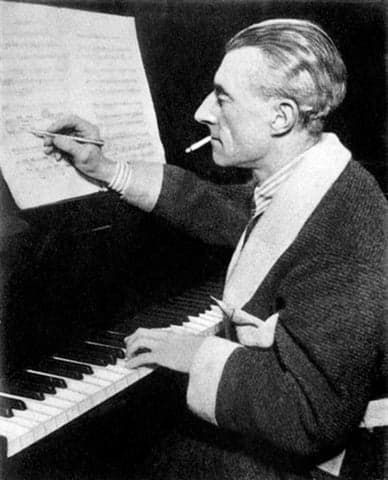Georges Bizet at 150
Honouring the Legacy of a Musical Genius
On 3 June 2025, we mark the 150th anniversary of the death of Georges Bizet (1838–1875), a composer whose brief but brilliant career left an indelible mark on the world of music. Passing away at the tragically young age of 36, Bizet departed just as his masterpiece, Carmen, was beginning to ignite stages across the globe.
Bizet has never been embraced by the French as a great national composer, and as Hugh Macdonald writes, “his output is indeed uneven… and while flashes of future potential are to be found from the earliest years, there is a lack of maturity and of focus until the last five years of his life.”
His 150th anniversary offers an opportunity to celebrate his extraordinary talent, from the vibrant melodies of his Symphony in C to the revolutionary passion of Carmen. Bizet’s legacy, born of a life cut short, continues to resonate, and his music remains as vital and captivating today as it was a century and a half ago.
Georges Bizet: Symphony No. 1 in C Major
Early Life and Musical Prodigy

Portrait of Georges Bizet by Felix Henri Giacomotti
Born Alexandre César Léopold Bizet on 25 October 1838, in Paris, Georges Bizet was immersed in music from an early age. His father, Adolphe, was a singing teacher and amateur composer, while his mother, Aimée, was an accomplished pianist. This musical household nurtured Bizet’s talents, and by age four, he was already reading music.
His prodigious abilities led to his admission to the Paris Conservatoire at the tender age of nine, an extraordinary feat even in the musically rich environment of 19th-century Paris.
At the Conservatoire, Bizet studied under some of the finest musicians of the era, including Charles Gounod, who would later become a significant influence.
His teachers quickly recognised his exceptional gifts, particularly in composition and piano performance. By his teens, Bizet was composing works of remarkable sophistication, including his Symphony in C written at age 17. He won the prestigious Prix de Rome at age 19, exposing him to Italian opera and culture, yet he struggled with self-doubt and the pressure to produce a masterpiece worthy of his potential.
Georges Bizet: Te Deum (Katarina Jovanovic, soprano; Philippe Do, tenor; Pas-de-Calais North Regional Choir; Lille National Orchestra; Jean-Claude Casadesus, cond.)
Parisian Struggles
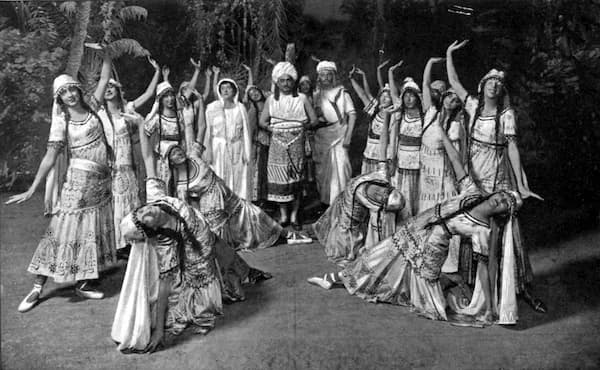
An Act II scene from the 1916 Metropolitan Opera production of Bizet’s Les pêcheurs de perles
Upon returning to Paris in 1860, Bizet faced the harsh realities of the Parisian musical scene. The city was a hub of artistic innovation but also fiercely competitive, with established composers like Gounod, Offenbach, and Meyerbeer dominating the opera houses. His first full-length opera, Les Pêcheurs de Perles (The Pearl Fishers), met with mixed success, with hostile reaction from the press condemning the libretto as absurd and the score as noisy and offensive.
Bizet followed up with his four-act opera La jolie fille de Perth (The Fair Maid of Perth), based on a Walter Scott novel, in 1867. The opera was well-received but only ran for 18 performances, matching Bizet’s earlier Les pêcheurs de perles at the same venue. A production in Brussels from April 1868 was a disappointment, and the lack of success left Bizet visibly anxious.
Bizet’s struggles were not solely artistic, as he was plagued by financial difficulties during this period. To support himself, he took on work as a piano teacher, arranger, and rehearsal pianist, leaving little time for compositions. His marriage to Geneviève Halévy in 1869, the daughter of his former teacher Fromental Halévy, brought some stability, but personal and professional pressures continued to mount.
Georges Bizet: “Au Fond Du Temple Saint,” Les pêcheurs de perles
Towards Carmen
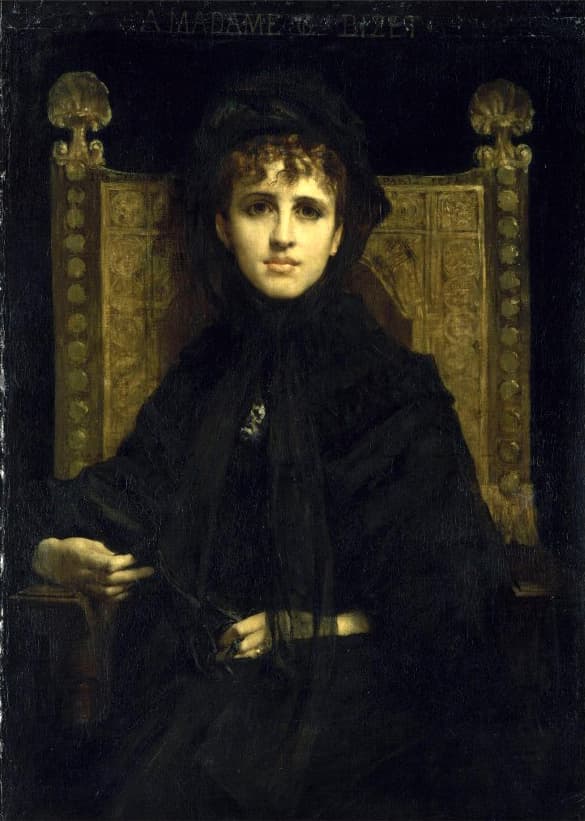
Jules-Élie Delaunay: Madame Georges Bizet
The world of Parisian opera was governed by rigid conventions, with audiences attuned to the grandiose spectacles of grand opera. Bizet’s frustration with the constraints of the opera-comique genre, which demanded spoken dialogue and lighter themes, pushed him to experiment with new forms of musical storytelling. Initially, Bizet’s patron at the Théâtre Lyrique had mounted a production of Daudet’s play L’arlésienne at a vaudeville theatre.
As with most incidental music of the period, the orchestra was small and the musical insertions mostly short. Bizet relied a good deal on the device of mélodrame, where music is played under spoken dialogue. The music was composed quickly in the summer of 1872, and the play opened on 1 October. It was not well received, and both Daudet and Bizet were bitterly discouraged. Bizet quickly arranged four extracts from the music as a suite for full orchestra, and its success was immediate and lasting.
As it happened, Bizet was then commissioned by Opéra-Comique directors du Locle and de Leuven to create an opera with librettists Meilhac and Halévy. He proposed adapting Mérimée’s 1845 novel Carmen, but its risqué themes and the violent onstage death of Carmen caused hesitation, dividing the directors and delaying the opera’s production.
Georges Bizet: L’Arlésienne Suite No. 1 and No. 2
A Revolutionary Masterpiece
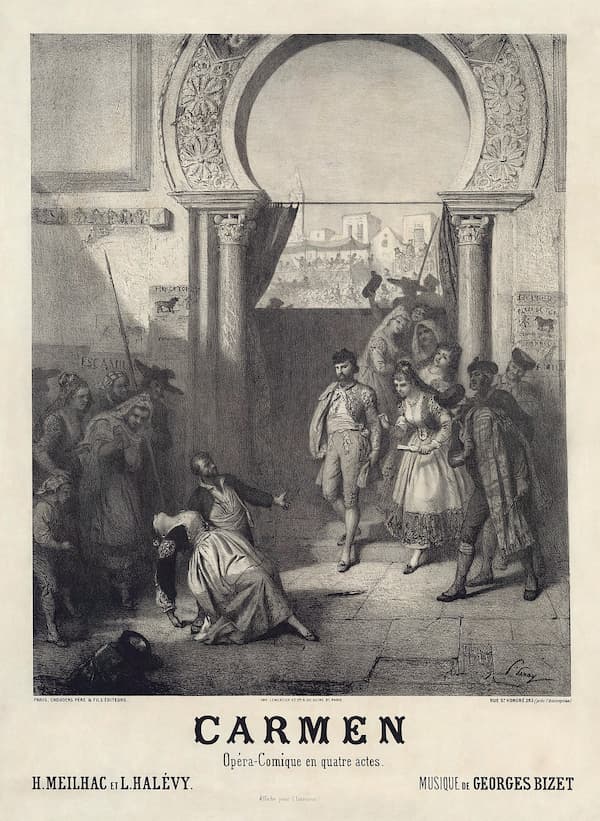
1875 lithographic poster for the première of Georges Bizet’s Carmen, Published by Choudens Pére et Fils and Imp. Lemercier et Cie.
Bizet, along with his librettists, transformed the story into a vivid and emotionally charged opera that broke new ground in terms of realism and psychological depth. From the very beginning, Carmen was a bold departure from the norms of opera-comique. Its provocative themes of lust, betrayal, and violence shocked audiences accustomed to sentimental tales of love and virtue.
The true revelation, however, is to be found in Bizet’s music. He infused the score with vibrant Spanish-inspired melodies, sultry rhythms, and a raw emotional intensity that captured the essence of Carmen’s untamed spirit. The most iconic numbers like the “Habanera” and the “Toreador Song” are not only catchy but also deeply expressive, revealing the inner lives of the characters with unparalleled clarity.
Bizet’s orchestration in Carmen is a masterclass in colour and texture, evoking the heat of Seville, the tension of the bullfight, and the emotional turmoil experienced by the characters. His ability to blend French lyricism with Spanish folk elements created a sound that was both exotic and universal, appealing to audiences far beyond Paris.
Georges Bizet: “L’amour est un oiseau rebelle,” Carmen
Premiere and Death
The premiere of Carmen on 3 March 1875 was met with controversy, with critics and audiences scandalised by Carmen’s unapologetic sexuality and the opera’s tragic ending. Despite the outraged response from the audience and a hostile press, Carmen was not a failure. It ran for 45 performances in 1875, and as a scholar writes, “as many were attracted as were repelled by its scandalous tone.”
Bizet had often been beset by a melancholy mood that weakened his resistance to ailments from which in other circumstances he might well have recovered. He was soon battling a bacterial infection and rheumatism, with pain in his ears as well as his throat. After going for a swim in the Seine, he suffered a severe attack of rheumatism on 30 May 1875.
Bizet suffered two heart attacks shortly thereafter, likely caused by years of stress and overwork. He died in the early hours of 3 June, a few hours after the 33rd performance of Carmen. He was only 36 years old, and the funeral took place at the church of La Trinité in Paris. Bizet was buried in the Cimetière Père-Lachaise.
Georges Bizet: “Votre toast, je peux vous le render,” Carmen
Opera, Orchestral Gems, and Piano Ventures
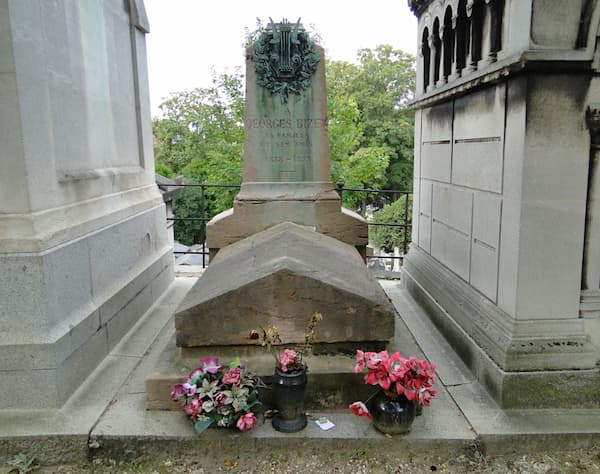
Tomb of Georges Bizet
Bizet had planned or projected as many as 30 operas, but only six now survive, and only five were performed in his lifetime. His versatile style spanned farce and high drama, but indecision about his career led him to pursue unproduced projects in Paris. His early stage works showcased his melodic and harmonic flair, while the last works revealed his mature genius, “blending vivid characterisation, chromatic harmony, and evocative orchestration.”
His orchestral works are often overshadowed by his Symphony in C and L’arlésienne, all displaying remarkable freshness and lyrical brilliance. His early vocal music emerged from compositional exercises, and he left us two completed cantatas. Choral works feature vivid moments but are drawn more to operas, while his songs “reveal melodic gifts, literary taste, and exotic flair.”
With the exception of the masterly Jeux d’enfants for four hands, Bizet’s piano music has never entered the pianist’s canon. As a scholar writes, “his solo works are miscellaneous in genre and mostly too difficult for the amateur player.” We do find works from the Parisian virtuoso school, but Bizet never ventured into the larger forms. “So much of his energy was devoted to writing piano reductions of operas that he never developed an interest in the solo piano genres.”
Georges Bizet: Jeux d’Enfants op. 22
Posthumous Reception
Bizet’s music has made a remarkable journey from initial obscurity to enduring acclaim, largely driven by the meteoric rise of his opera Carmen. As the opera rapidly gained traction with performances across Europe and beyond, Bizet was recognised as a trailblazer who bridged French lyricism with dramatic intensity. Carmen is now one of the most performed operas worldwide, resonating across cultures and inspiring countless adaptations.
Following his early death, publishers issued unauthorised versions of many of Bizet’s most important works, all built on the world success of Carmen. Much of Bizet’s music was published with new titles and new texts, with cuts and revisions that were never fully explained. To be fair, Bizet “was always capable of mediocre work within the less exalted tastes of his times.”
However, as Hugh Macdonald writes, “the brilliance and the individuality of his best music is unmistakable. It has greatly enriched a period of French music already rich in composers of talent and distinction.”
For more of the best in classical music, sign up for our E-Newsletter



